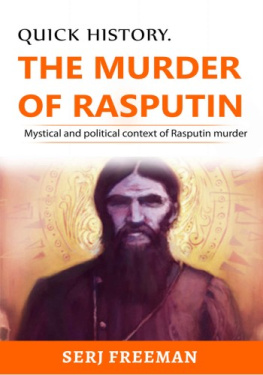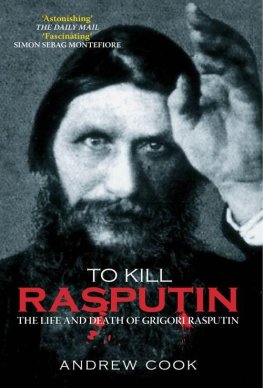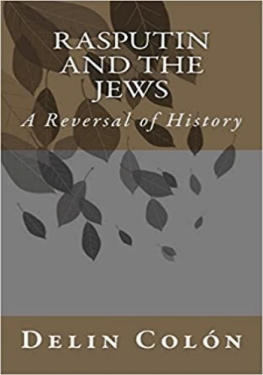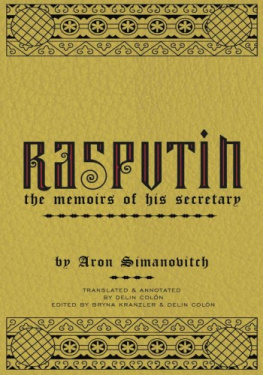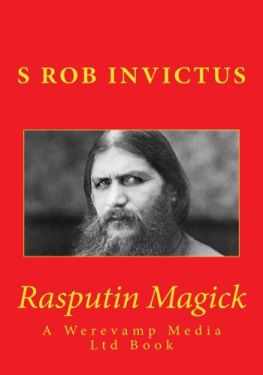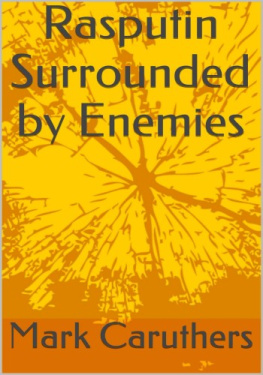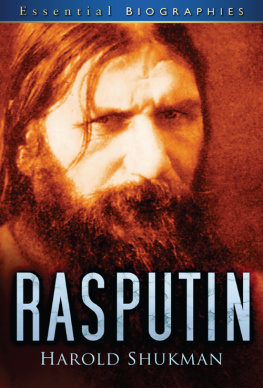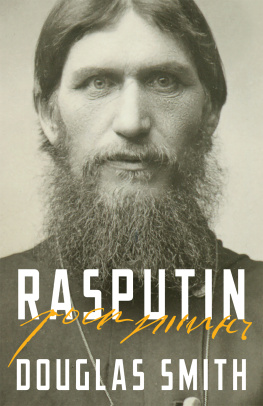Serj Freeman - The Murder of Rasputin: the Mystical and Political Context
Here you can read online Serj Freeman - The Murder of Rasputin: the Mystical and Political Context full text of the book (entire story) in english for free. Download pdf and epub, get meaning, cover and reviews about this ebook. year: 2018, genre: Art. Description of the work, (preface) as well as reviews are available. Best literature library LitArk.com created for fans of good reading and offers a wide selection of genres:
Romance novel
Science fiction
Adventure
Detective
Science
History
Home and family
Prose
Art
Politics
Computer
Non-fiction
Religion
Business
Children
Humor
Choose a favorite category and find really read worthwhile books. Enjoy immersion in the world of imagination, feel the emotions of the characters or learn something new for yourself, make an fascinating discovery.
- Book:The Murder of Rasputin: the Mystical and Political Context
- Author:
- Genre:
- Year:2018
- Rating:3 / 5
- Favourites:Add to favourites
- Your mark:
- 60
- 1
- 2
- 3
- 4
- 5
The Murder of Rasputin: the Mystical and Political Context: summary, description and annotation
We offer to read an annotation, description, summary or preface (depends on what the author of the book "The Murder of Rasputin: the Mystical and Political Context" wrote himself). If you haven't found the necessary information about the book — write in the comments, we will try to find it.
Serj Freeman: author's other books
Who wrote The Murder of Rasputin: the Mystical and Political Context? Find out the surname, the name of the author of the book and a list of all author's works by series.
The Murder of Rasputin: the Mystical and Political Context — read online for free the complete book (whole text) full work
Below is the text of the book, divided by pages. System saving the place of the last page read, allows you to conveniently read the book "The Murder of Rasputin: the Mystical and Political Context" online for free, without having to search again every time where you left off. Put a bookmark, and you can go to the page where you finished reading at any time.
Font size:
Interval:
Bookmark:
Copyright 2018 by UR Publishing
ALL RIGHTS RESERVED
No part of this book may be reproduced, stored in a retrieval system, or transmitted in any form or by any means, electronic, mechanical, photocopying, recording, scanning, or otherwise, without the prior written permission of the publisher.
ContentsIntroduction
The Occult Revival in Europe
Palace Intrigues
The Rise of Rasputin
Rasputin and the Royal Family
The Mad Monk in St. Petersburg
Heliodorus' Revenge
WWI and Political Crisis in Russia
The Murder of Rasputin
IntroductionO n December 16, 1916, Grigori Yefimovich Rasputin, better known simply as Rasputin, was brutally killed in the Yusupov Palace on the bank of the Moika River in St. Petersburg, then the capital of the Russian Empire. Some have argued that he was killed by a group of patriotic monarchists who wanted to save the throne from his malignant influence. In some English and Hollywood movies, the hand of British intelligence is shown to be behind the murder.
Yusupov Palace on the Moika River
The researcher, Oleg Shishkin, believes that it was not the English, but the German intelligence behind Rasputin's murder. None of these theories have produced any real, convincing evidence. Grigory Rasputin was hated in court circles because he had managed to become very influential with the Imperial family. He is a singular phenomenon in world history because it is difficult to find another historical figure coming from the lower class who could influence the monarchy, without holding a state post. This situation is unique and why Rasputin reached his position is a story that deserves our attention.
There are three main reasons that are closely connected with what happened in Russia, explaining the rise of Rasputin.
The Occult Revival in EuropeA t the beginning of the 20th century, there was great interest in everything occult and paranormal. Why this occurred is difficult to say. There are different points of view in this regard. It came about despite the advances of science and technology. People began to believe in the occult even as high-speed ships connected continents, railroads crossed thousands of kilometers, and the phone and telegraph appeared - the most modern means of communication. The world was at peace, and yet there was a feeling that there was something wrong; thus many turned their attention to the occult. Some did not like the new technologies and the idea of progress and believed that the spiritual aspects of life were being lost.
This interest in the occult was compensation for the new and unsettling technological changes.
In America and all the countries of Europe during this period, interest in the arcane grew, and even respected figures such as Arthur Conan Doyle, the famous British writer and author of the Sherlock Holmes stories, was an inveterate supporter of everything mystical and occult. He even wrote a history of spiritualism. He was a most inveterate practitioner of spiritualistic sessions and in every possible way promoted the ideas of an afterlife. When Leo Tolstoy arrived in London and met Conan Doyle, he told him, "Listen, Mister Tolstoy, let's agree: if I die first, then I will try to give you the sign and if you die first - you try to give me a sign. This kind of talk was very common in the highest circles of society.
The interest in spiritualism and the occult spread to Russia and influenced not only the Imperial couple, Nicholas II and Alexandra Feodorovna, but practically all the elite. They became enamored with spirits and magic and went to Europe to get acquainted with the most advanced occultists of the day.
Doctor Anthelme Nizier Philippe was a famous occultist, something of a magician and the practitioner of various mystical doctrines. Philippe called himself, Doctor Philippe, but he was not a doctor and no medical educational institution in France was going to issue him a diploma.
Anthelme Nizier Philippe
Despite his false claims, some of Phillipes admirers and fans considered him to be Christ's reincarnation on earth and subsequently they attributed the same to Grigori Yefimovich Rasputin. Olga Vladimirovna Lokhtina, his most ardent fan, considered Nizier close to being a god, too. Indeed, the credulous believed that he was the reincarnation of Christ and the embodiment of the god, Sabaoth, on earth.
Nizier Philippe was very popular and gained European-wide popularity. The Russian grand dukes coming to France sought to visit this remarkable person to become acquainted with him and join the most advanced trends in occultism. Perhaps his most ardent adherent was the grand duchess Milica Nikolaevna, the so-called Princess Milica of Montenegro, who among the Romanovs had a somewhat dubious reputation. She was interested in modern European occult trends, and having gotten acquainted with Nizier Philippe in France, she fell under his spell.

Princess Milica of Montenegro
Then there was Grand Duke Nicholas Nikolaevich, the cousin of Nicholas II, thought himself to be the outstanding Russian military commander during World War I. In 1914 and 1915, he held the post of Supreme Commander of the Russian Imperial army on the Caucasian front.
This interest in the occult did not only intrigue the fashionable out of curiosity but also those who sought to learn and try anything different. It captured people who were not sure of themselves. The Emperor Nicholas II and the Empress Alexandra Feodorovna were highly interested in the new trend. Nicholas II took part in sessions that sought to communicate with the dead. He wanted to consult with his father because Alexander III had an indestructible will and was a capable monarch. He was a controversial figure seen as a strong leader by many, and others state that his policies led to the Revolution.
Alexander III was much admired by his son, Nicholas II. He revered his father and when he died, he naturally aspired to receive guidance and those lessons that he failed to receive during his lifetime because Alexander III, for some reason, did not consider them necessary. As a result, Nicholas II was not prepared for his role as Tsar.

Grand Duke Nicholas Nikolaevich
The death of the Tsar Alexander III came as a terrible surprise. He was still young, and in apparent good health and died suddenly. This led the inexperienced and weak Nicholas to ascend to the throne. The incapable young Tsar decided to participate in spiritualistic sessions to get advice from his father. Nicholas wanted to ask his father how to defeat a revolution if it should happen. Nicholas II was a weak ruler without his fathers support and was easily misled by corrupt courtiers. This led to a great deal of corruption and mismanagement in the Russian Empire.
Milica Nikolaevna advised the Imperial couple to become acquainted with an outstanding person who would open a secret world to help them with public administration. This took place in 1901 when Nicholas II first met Doctor Philippe in France. Doctor Philippe was pleasant enough, and the Tsar invited him to St. Petersburg where Philippe for some time became a society star. Nicholas II eventually became suspicious and asked the doctor about his medical diploma. Despite this, the Frenchman was able to convince the royal couple that he was not an impostor. Philippe Nizier was famous, continually advised Alexandra Feodorovna and other members of the elite in St Petersburg.
Next pageFont size:
Interval:
Bookmark:
Similar books «The Murder of Rasputin: the Mystical and Political Context»
Look at similar books to The Murder of Rasputin: the Mystical and Political Context. We have selected literature similar in name and meaning in the hope of providing readers with more options to find new, interesting, not yet read works.
Discussion, reviews of the book The Murder of Rasputin: the Mystical and Political Context and just readers' own opinions. Leave your comments, write what you think about the work, its meaning or the main characters. Specify what exactly you liked and what you didn't like, and why you think so.

